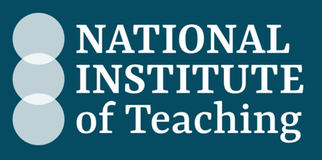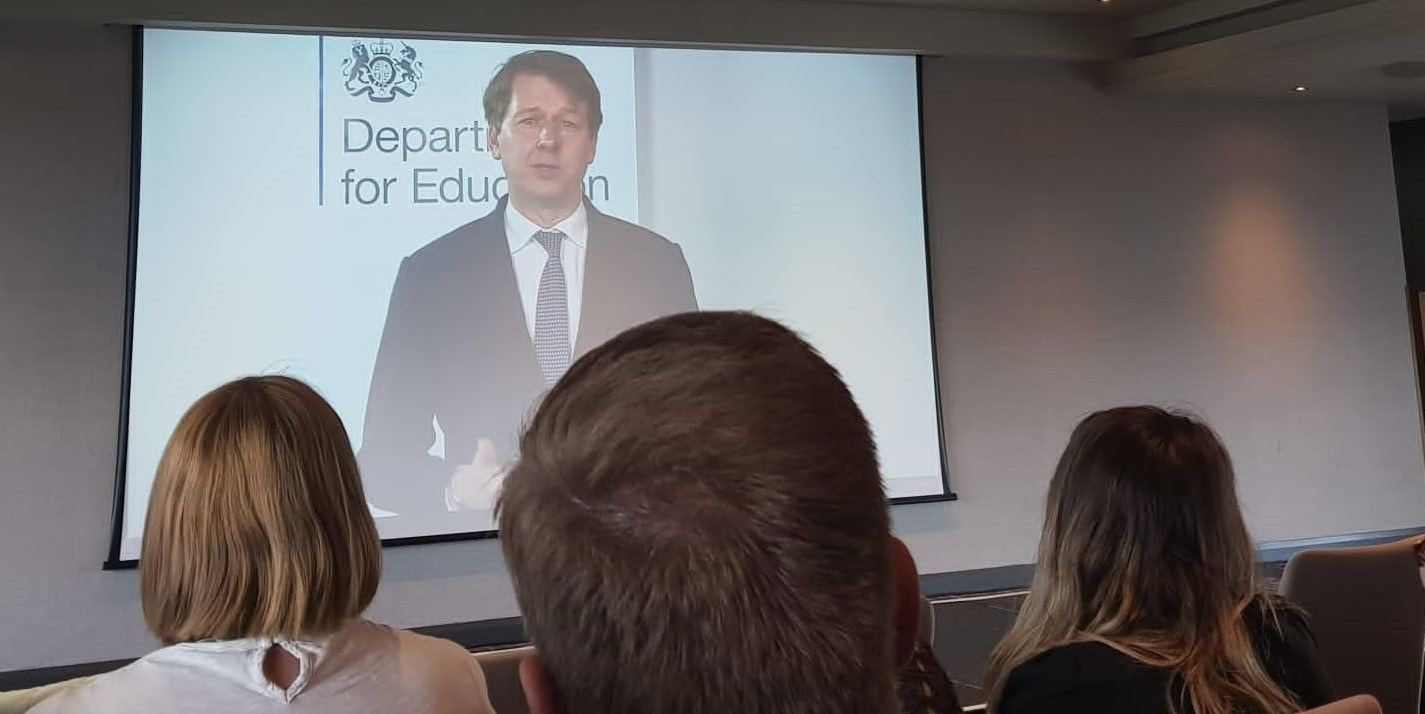|
It is the penultimate UPDATE newsletter for this academic year 2023 - 2024 and we hope that there will be something of interest for you in this June issue.
Associate & Strategic Leader of Teaching & Research Schools (ESW) Roger Pope CBE gets into TikTok and the #WorkTok trend that leads to thoughts on today's workforce with reference to Professor Thomas Roulet at the Cambridge Judge Business School: "He argues that what has changed is not a willingness to work hard, but rather what we now ask from work. Our work has become a more significant part of our lives. The demands on younger generations are greater than those on older generations. They are asked to give more - and so they ask for more in return." As we will soon have completed our first three years as Teaching School Hubs, we tot up the numbers of colleagues who have engaged in over 80,000 hours of training with SWIFT and muse on the direct impact on the quality of education and lives of young people in South West schools. We also share some of the benefits from our recent wellbeing in the workplace training with ACAS. Our interviewees this time are Krisha Gandhi of Cranbrook Education Campus and Tom Pether of East Allington Primary School and also valued co-Chairs of the SWIFT Diversity, Equity and Inclusion Partnership Group. Kingsbridge Research School enlighten us with The Education Endowment Foundation’s new and updated Guide to Effective Implementation and highlight the changes. Understanding that Health and Safety is a fact of a life and practical awareness is essential for schools, our sponsor SchoolPro TLC has recently added SchoolPro Safety to its arsenal of services to schools and you can find out more about their services. Other sponsor news. ONVU Learning considers whether cameras in the classroom means Big Brother is watching you (spoiler alert - no! It is much more exciting in the 21st Century). Remember, you can meet ONVU Learning in a FREE Excellent Teachers Create Excellent Memories Webinar on Thursday 11 July 2024 from 0830 – 0900 and also at our Summer Conference on Thursday 13 June 2024. Educatering have been busy showcasing their food and bespoke menu service at conferences across the South West and bring more enticing foodie delights that are enjoyed by many children, young people and staff in school across the South West - and beyond. You will also meet them at the Summer Conference and feast on their food. Exeter Supply Partnership provides some super-helpful-positive guidance on how to be a Supply Friendly School. It makes sense. See how many your school can tick off. As always, we wish you a rewarding final half term and thank you for working with us.
0 Comments
 “I enjoy nurturing partnerships and I am continuously reminded of their importance in every we do.” As we embrace this new year as a time of renewal and revitalisation and as the culmination of the first four-years cycle of Teaching School Hubs, it seemed opportune to check in with our Executive Director, Martin Smith to reflect on his role in leading the Colyton and Kingsbridge Teaching School Hubs, as you will know as SWIFT (South West Institute for Teaching). Martin started his career as a Teacher of History in Herefordshire and became an Advanced Skills Teacher early in his career, working as a Teaching and Learning consultant for Gloucestershire Local Authority. For four years he was Deputy Head of a rural 11 to 18-years school in Herefordshire, before becoming a secondary Headteacher in East Devon for eight years. As the backdrop to his current leadership, Martin led the formation of the Dartmoor Teaching School Alliance and in 2020 he was appointed founding Director of Teaching Schools South West (TSSW) as one of six Department for Education’s test and learn Teaching School Hubs with Kingsbridge Community College the lead school. A year later, with the roll-out of 81 further Teaching School Hubs as national centres of excellence, Martin orchestrated combined of operations with the newly formed Colyton Teaching School Hub, with Colyton Grammar School the lead school to create SWIFT. 1. What did you anticipate from your role of leading the Test and Learn Teaching Schools South West (TSSW)? I anticipated that there was a great opportunity to create a system for schools that was more joined-up with less duplication, and less overload of providers delivering similar programmes. This, of course, was mainly the professional development Early Career Framework (ECF) programme, before the launch of the reformed National Professional Qualifications (NPQ's) and before the Department for Education’s Golden Thread of professional development. My role was to focus on bringing together partners who were experienced in making significant contributions in the area and included the former Teaching School Alliances and Multi Academy Trusts who were emerging onto the scene and growing rapidly. As part of my role, I anticipated bringing together the different components into a coherent partnership framework. 2. What do you believe to be the most important function for Teaching School Hubs and has that changed over the past four years? The most important function is to provide high-quality professional development for teachers and leaders because we know that if teachers and leaders engage in high-quality professional development, it has a positive impact on the quality of what they do in the classroom and the outcomes for young people. Teaching School Hubs also have a key role to play in the teacher recruitment and retention agenda. Recruitment, by improving initial teacher training (ITT) and making it accessible to more people. Retention, in running high-quality Early Career Framework programmes that support new teachers, and inspire them to stay in the profession for longer, and to provide a pathway for more experienced school leaders through the NPQs so that this journey of growing and developing continues beyond the first few years of teaching. Therefore, well trained and supported teachers are more likely to stay in the profession for the longer-term and Teaching School Hubs are making an important contribution to the recruitment and retention of teachers. It is also important to create a coherent and accessible professional development structure for Schools and Trusts. One of the drawbacks of the previous iterations of Teaching Schools was working with a large and disparate number of Teaching School Alliances – along the lines of 14 across Devon, Plymouth and Torbay, all of which were providing their own professional development and initial teacher training and as a Teaching School Hub we wanted to create a clear and accessible marketplace for schools to access high-quality professional development. A clear marketplace incentivises and supports schools to engage in professional development. 3. What has been the most constructive learning point to date in your tenure as Executive Director of SWIFT? It is more of a validation and something that is constantly validated for me is the importance of partnership in building long-term high-quality partnerships based on strong relationships with trust, a genuine collaboration, sharing and a generosity between partners. I enjoy nurturing partnerships and I am continuously reminded of their importance in every we do. 4. What do you find to be the most personally rewarding for you in the role? Personally, I have always enjoyed seeing people flourish in their roles and organisations and knowing that as Teaching School Hubs, we are enabling colleagues across the profession to take on new opportunities. Whether it is to design an ITT curriculum, become an ECF Mentor, lead ECF Mentors or facilitate an NPQ. I think that these opportunities across the partnership are truly inspiring and we know that they can make an important difference to people's professional lives. In addition, we now have a not-insignificant SWIFT Central Team of ten people and it is very gratifying to see them grow and develop as individuals and as a team to embrace challenges and celebrate successes. 5. What would be your vision and hope (s) for the next four years of Teaching School Hubs? If we are successful in our re-designation for the next four years, I think my vision will largely remain the same to create those high-quality pathways for teachers from initial teacher training through to Executive Headship and to continue to develop and ensure that these opportunities are meaningful and relevant. We always want to give schools in the South West the best of regional, national and available evidence. We have always believed very strongly in our vision to give South West leaders the best opportunities available and we are committed to this mission that continues, not least with the exciting opportunity we now have with SWIFT Teacher Training to increase the number of teachers entering the profession across our area. There are many great ITT providers within our region and we want to work alongside those existing providers to support potential trainees with the requisite skills and commitment who wish to get into teaching. I also hope that we can adapt to the changing educational context towards larger Multi Academy Trusts (MATs) and at a practical level, as Teaching School Hubs, we are very keen to be responsive to the needs of growing MATs and offer more personalised approaches to ITT and NPQs that allows them to access the benefits of a national programme, but at the same time put their own Trust stamp on the experience. We thank Martin for his reflections and his continued leadership of SWIFT. Interview by Jude Owens, SWIFT Executive Assistant 11/10/2023 0 Comments Interview with Jenny Sutton, Regional Principal, South and West – National Institute of Teaching “I genuinely love working with our Associate Colleges because [THEY] all want to build a really strong partnership with us, that genuinely ensures the programmes we develop and deliver together are of maximum benefit for teachers and leaders.” Jenny Sutton is the National Institute of Teaching's founding Regional Principal for the South and West and was previously a Head of School Partnerships at Teach First leading on their relationships with Teaching School Hubs as Delivery Partners for the Early Career Framework (ECF) and Reformed National Professional Qualifications (NPQs), having previously spent seven years as Teach First's South West Regional Director, founding their work in this region. Prior to this role, Jenny spent ten years as a Teacher of English and Drama, Head of Faculty and Assistant Head in two large secondary schools in Islington and Hackney. Jenny is an 09 cohort member of Future Leaders and Teach First Ambassador. 1. How do you anticipate the work of the Associate Colleges/Teaching School Hubs in working with the National Institute of Teaching will benefit their schools?
The National Institute of Teaching offers genuinely schools-led programmes. We are led by the School Led Development Trust, an organisation set up by four leading School Multi Academy Trusts: the Harris Federation, Star Academies, Oasis Community Learning and Outwood Grange Academies Trust. They are responsible for 188 primary, secondary and Post-16 schools and colleges and educate 100,000+ children in communities ranging from Southampton to Middlesbrough and from Blackpool to Battersea. This provides a very rich national network for the National Institute of Teaching to tap into when it comes to the delivery and design of our programmes. For example, our suite of National Professional Qualifications (NPQs) all provide national Masterclasses led by the best experts from that national network. This provides new insights for schools in Associate Colleges to tap into, alongside the regionally-run aspects of the programme, which are grounded in local context e.g. termly in-person conferences. We also host Virtual School Visits for our NPQ programme members in schools in our founding MATs, which similarly provide a window into areas of good practice nationally. The focus of these is driven by our research and feedback from our programme members about their needs. For example, for the NPQ in Leading Teacher Development, if schools were struggling in getting early teachers to buy into practice-based learning, the National Institute of Teaching could share a virtual visit of a school that has successfully embedded this into their school and look at some of the key factors and principles underpinning successful implementation. It is vital for us that all our delivery is facilitated by those working in schools and leading this work day in, day out. We also have a rich network of national experts outside of our four founding Trusts; providing speakers that more isolated schools and communities might not necessarily be able to hear from or might have to travel to London to hear from. For example, programme members on our ECF programme are able to attend a series of Masterclasses with experts, such as Tom Bennett leading sessions on behaviour. We provide these national webinars free of charge for colleagues who are on a National Institute of Teaching programme. Thirdly, we have a strong research arm to our work and are continually being commissioned to deliver research in key areas of development for the educational sector. For example, we are working in partnership on a piece of research in how artificial intelligence (AI) could be used in education and we are interested in how AI could be used in professional development to increase efficiency and teacher well-being, recognising the potential challenges of achieving a good work-life balance in education. We are also keen to look at research in areas of particular interest for our Associate Colleges. For example, we are currently working on a piece of research with SWIFT about how the Early Career Framework (ECF) is running in small schools, particularly small primary schools. We also include the experience and feedback from our Associate Colleges when considering future policy developments. Finally, we are working towards becoming a university that is dedicated to the professional development of teachers and leaders and this will hopefully provide exciting opportunities for our Associate Colleges. 2. What do you believe is the greatest challenge for the National Institute of Teaching? I think the greatest challenge for the National Institute of Teaching is the pace of the work - going from the design, to implementation to delivery stage in a short space of time in a relatively small organisation across several programmes. In year one, we are delivering initial teacher training for 500+ trainees and delivering the ECF to thousands of programme members and delivering the full suite of NPQs, so there's lots of piloting and learning in a short space of time. We have also recently been successful in our bid to be accredited to deliver the new NPQ in Leading Primary Maths. 3. What do you hope to achieve personally from working with Associate Colleges? I genuinely love working with our Associate Colleges because all our Associate Colleges want to build a really strong partnership with us, that genuinely ensures the programmes we develop and deliver together are of maximum benefit for teachers and leaders. So, if colleagues from SWIFT schools take part in these programmes, they have to feel like it was a good use of their time...that is fundamental - we both understand that time is precious for teachers and school leaders, so are both motivated by impact and efficiency. We thank Jenny for her insights into the work of the National Institute of Teaching and SWIFT is pleased to be supporting their work as two of the Associate Colleges. Interview by Jude Owens, PA to the Executive Team and Governance In this final issue for this academic year, ESW Associate & Strategic Leader of Teaching & Research Schools | Education South West, Roger Pope CBE considers in this continued post-pandemic aftermath, “Why is it that our leadership skills are being challenged to such lengths?”
"So, this is when we have to dig deep into our leadership reserves. It’s a time when we have to believe in ourselves, to let go of what we cannot change and focus on those things that we can influence in our own schools." Building on SWIFT's commitment to Diversity, Equality and Inclusion (DEI), SWIFT's Professional Community lead, Ruhaina Alford, Executive Headteacher of The Carey Federation gives us an end of term report. At this point of end of term completeness, you can read about SWIFT's Director, Chris Harris's reflections as he ends his tenure with us and an interview with Programme Manager, Fiona McNeile who continues the good work of our programme delivery. And have your say in the Annual Teaching School Hub School Leader Satisfaction Survey. Our sponsor, SchoolPro TLC provides guidance on taking subject access requests seriously and find out some of the latest from Educatering, Exeter Supply Partnership, Lyfta and Praestantia Technology.  “I am very fortunate to have a role that is fulfilling in many ways.” The SWIFT Central Team also counts itself fortunate to have Fiona McNeile as a key team member. Albeit modest sized, the team is highly functional and purposeful with Fiona as Programme Manager for our key Department for Education Golden Thread services from the Appropriate Body Service and Early Career Framework for Early Career Teachers, to National Professional Qualifications for aspiring school leaders. Fiona transitioned seamlessly to her role in SWIFT having previously worked as Business Manager with the former Dartmoor Teaching School Alliance; which has helped to enhance and evolve her understanding of the emerging role of Teaching School Hubs. We value Fiona for her clarity, diligence, pragmatism, and powerful work ethic and drive. As this second complete year of the Early Career Framework draws to a close, we thought that it would be fitting to invite Fiona to reflect on the programme. 1. As SWIFT Programme Manager what are your number three priorities working closely with teachers and school leaders? As SWIFT Programme Manager, a key priority is to work with our SWIFT Team to ensure consistent, high-quality programme delivery to all schools in our region. The processes and requirements of the Golden Thread programmes are complex, and my aim is to support schools by providing access to the world class programmes with minimum workload for leaders and teachers. Having worked in educational support roles for over six years, I have built an in-depth understanding of the pressures and demands on schools, Multi Academy Trusts (MATs), leaders and teachers. We work hard as a team to keep informed through constant one-to-one communication with SWIFT schools and leaders to ensure our delivery models are aligned to the needs of the region. This has been key to the continuous improvement and development of enhancements beyond the requirements of the Golden Thread programmes and services which are now in place. 2. What is most rewarding for you personally in your role as SWIFT Programme Manager? I am very fortunate to have a role that is fulfilling in many ways. From our Early Career Framework (ECF) programme, it is a privilege to be able to support Early Career Teachers (ECTs) to develop their craft and to progress in their careers. Already we have Year 2 ECTs who have completed their SWIFT ECF programme and statutory inductions, who will be Mentors to new Year 1 ECTs in September. Others are fulfilling Subject Lead roles or taking on School Leadership Team responsibilities, and many are progressing their training through the National Professional Qualifications (NPQs). To be part of this journey is very rewarding and from my Appropriate Body Service role, I learn how this translates in the classroom and affects whole school progress. As NPQs Programme Manager, it is humbling to support future leaders and be part of their career journey too. I also get to work with awesome and fascinating professionals! MAT CEOs, Mentors, Facilitators and Delivery Leads, Subject Specialists, ECTs, the wonderful network of SWIFT partners and our super SWIFT Central Team mean that I learn something new every day. Given the variation to my role, I am lucky that there is never a dull moment! 3. What has been the biggest challenge (if any) and how have you successfully overcome it? Moving from a Teaching School Alliance Business Manager role to a regional Teaching School Hub Programme Manager role was a shift in gear and I have had to upskill my knowledge in national programme delivery requirements extremely quickly. As with any change to the education system, navigating the best path for delivery to schools which best meets local needs has also taken a lot of careful planning and I would not have been able to do this without the support of our Central Team, in particular, Chris Harris, SWIFT Deputy Director who has been my Line Manager for the past two years and a wonderful Mentor and also Natalie Markham and Elisabeth Wandl who are superb administration professionals. 4. What do you believe to be the most important element of SWIFT that you wish to convey to our Teaching School Hub /programme member schools?
SWIFT exists to serve schools – ‘simple as’ SWIFT staff and partners are aligned in this task to serve schools with quality Continuing Professional Development services and support. We have a shared moral compass demonstrated in all that we strive to achieve. Our Utopia is that all children in our region have high-quality education and we will do all we can to support schools, leaders and teachers to achieve this outcome. This is what SWIFT team members have in mind behind every part of the programme delivery, every email, every conversation and every offer of support. 5. What are your hopes for the next academic year? For the first time in 2023 - 2024 we will be aligning with two lead providers to ensure that schools have the best choices and options available to them for their Golden Thread provision. We have a strong partnership with Teach First, an Ofsted Outstanding ECF Lead Provider and now, through our role as an Associate College, we will be part of the regional research work and programmes led by the National College of Teaching (NIoT). This presents internal challenges as we integrate new processes whilst maintaining the same level of service and delivery. However, these are exciting challenges and whilst we go through some of the ‘baby steps’ I am hopeful that they will lead to further programme enhancements and improvements in our core offer to schools. We thank Fiona for her continued commitment and conscientious good work. "Partnership, relationships, collaboration, good practice. You could call it SWIFT-ness." Education is conventionally cyclical. Pupils and young people evolve and progress through their schooling steps before moving on in their life journey. The same is true of our colleagues. At the end of this academic year, we will be saying a sad farewell, but a grateful thank you to Chris Harris as he moves on to his new role as Deputy Headteacher at The King’s School in Ottery St Mary. Based at our Colyton Office at Colyton Grammar School in his role as Director of Teaching School Hubs and Assistant Headteacher; true to the partnership ethos of SWIFT, Chris has counted himself fortunate to work closely with the Colyton team, as well as the other Central Team members and of course, with our wider SWIFT partnership. The SWIFT Central Team counts itself fortunate that Chris has been with us for two years and we have all benefitted from his dedicated and dynamic leadership that has masterfully been modest and yet momentous in leading on the programme delivery of the Appropriate Body Service (AB), Early Career Framework (ECF) and National Professional Qualifications (NPQs). And always with an eye for detail, calm tenacity, pragmatism – and a superb sense of humour. As SWIFT also evolves and progresses it seemed well-timed to share some of Chris’s reflections on his time with SWIFT and as a tribute to his conscientious work.  It has been important to me and the SWIFT Team to present our essential values in our core SWIFT business so that we are trusted by our schools. This is true of our delivery on the Hub programmes driven by a desire to support all schools of all types - whether a large Multi Academy Trust or a small standalone primary. We want to support them equally and to facilitate and ensure that they are getting access to the best of national programmes and to deliver a high-quality service for all. This trust and support benefits from our knowledge and relationships that we tailor for the local needs of our schools so that the programmes work for everyone. SWIFT wants to be a listening and responsive Teaching School Hub – whether through the small school NPQs adaptations or additional SEND revision in the ECF that we understand is a priority for Devon and with a particular focus on all students to ensure an inclusive approach and to build a sense of belonging. Rooted in partnership has been elemental for our SWIFT work and has been pivotal to the thinking in my role. I would say that my understanding has evolved in terms of the power of partnerships, as together you are more than the sum of your parts (cue our SWIFT logo!) and this certainly has been the scale that we have been working at on the ECF and NPQs. Moreover, it would be impossible to deliver a high-quality service without our essential partnerships in all that we do in the reciprocal relationship of learning from one another and always striving to improve what you do. Not forgetting, the professional value of partnership in working with like-minded focused people and ultimately, as we understand from teaching, we are all driven by a strong moral purpose, on which I like to think my understanding is founded. Partnerships exist on many layers and to deliver effectively you need to be a partner with the schools and teachers and staff themselves and only then, can you truly achieve based on collaboration and consensus, which makes the partnership all the more convincing and robust. Professionally, my role with SWIFT has benefited me in building on this collaboration in being able to develop with some partners that I hope will stay with me throughout my career and I have truly appreciated seeing in action this power of partnerships and understanding that you have to be outward- looking all the time. I have also been in the privileged position of observing many different practitioners at work and listening to different schools and constantly and absolutely sharing good practice. Finally, a vital professional lesson for me is the reminder that you should never be in glorious isolation in our educational world and value your relationships and connections; as well as understanding the national framework in which we operate so that we can best serve the communities we work with. Partnership, relationships, collaboration, good practice. You could call it SWIFT-ness. We wish Chris every success and fulfilment in his new role and thank him for his legacy to SWIFT. We will miss him.  We welcome Jen Knowles, currently Director of West Country Training School Alliance as successor to Chris. I am delighted to be taking on the role of Director of Teaching School Hubs (TSH) from September, building on the excellent foundations laid by Chris and the SWIFT team. It is a privilege to have opportunity to work with 500+ schools across Devon, Plymouth, Torbay and beyond in teacher development at every stage of their career. This next stage of the TSH programme brings openings for further refinement of courses and programmes based on your feedback to further improve the experience of working with us and I look forward to working with you all. And we look forward to working with Jen. “The NIoT is going to revolutionise the way teachers receive training in this country, with cutting edge research alongside training delivered by national experts.” The Rt Hon. Nadhim Zahawi MP, Secretary of State for Education
At the end of last term, the Department for Education announced that the School Led Development Trust had been awarded the contract to deliver the new National Institute of Teaching (NIoT). The National Institute of Teaching is a new, ambitious, Government-funded body that sets out to transform teacher development. It is led by a school-led partnership of four Multi-Academy Trusts (MATs) with outstanding track records in school-led university-accredited teacher development: Harris Federation, Oasis Community Learning, Outwood Grange Academies Trust and Star Academies. Each of the founding MATs will lead one of the four Regional Campuses, and each campus is supported by three Associate Colleges. We are delighted that Education South West (ESW) has been appointed as one of the founding Associate Colleges and will be working directly with Oasis Community Learning. As an Associate College, ESW will be responsible for supporting the Regional Campus to ensure scale, reach cold spots in current provision and deliver the NIoT training programmes. This is exciting news for the SWIFT partnership and SWIFT's collective expertise and experience will play a key role in the design and delivery of the NIoT programmes within the region and evolve and build on our Teaching School Hub responsibilities within Devon, Plymouth and Torbay. So, what is the National Institute of Teaching?
What opportunities does the NIoT create for the SWIFT partnership?
These are very early days, so there is much to develop our thinking around and we look forward to future developments of the National Institute of Teaching. “You are the best of the best in delivering teacher development.” The SWIFT Central Team were pleased to attend the recent inaugural Teaching School Hub Council Training Day “Inspiring Excellence” in Birmingham opened by keynote speaker, Robin Walker, Minister of State at the Department for Education. Minister Walker began by thanking Teaching School Hubs for their “determination and hard work” in delivering Initial Teacher Training, the Early Career Framework and National Professional Qualifications - “an enormous benefit to teachers” and delivered in a short time within the context of the unique challenges of the Covid-19 pandemic. Direct support to school leaders is invaluable through TSHs as national networks of centres of excellence of teacher training and development across England. The essential role of TSHs is to ensure schools can access their entitlement to high-quality professional development and help provide school leaders with expertise and access to support in order to improve their practice – “and ultimately to change lives.” On that note, Minister Walker commended TSH colleagues for attending the TSHC training day as an investment in their own professional development. Great teachers are the bedrock of the education system. Minster Walker recalled his own schooling and the disappointment of being moved to the bottom set of Maths. Yet his teacher challenged and motivated him and helped him to succeed. Everyone can recall an inspirational teacher who transformed their life and empowered them to believe they could succeed. The DfE vision is for a world class education system. “Every teacher needs to improve, not because they are not good enough, but because they can be even better.” Dylan Wiliam Great teachers are made not born. The recent White Paper has stated by 2030 that every child will be taught by a great teacher. As part of this goal to support teachers to improve outcomes in the classroom they can access a “Golden Thread” world class professional development at every stage in their career, underpinned by evidence frameworks and reviewed independently by the Education Endowment Foundation (EEF). The DfE’s new national development infrastructure will also focus on the design and delivery of the ECF programme with TSHs the backbone in levelling up teaching quality. Importantly, evidence especially shows the positive impact of expert teaching for disadvantaged children and those children who have fallen behind in their learning. Minister Walker acknowledged reforms are in their infancy and delivery requires focus “to consistently listen, learn and improve our delivery.” But, as part of these reforms, it is pleasing to report to date that over 25,000 Early Career Teachers (ECTs) and 23,000 Mentors have undertaken the funded ECF Induction programme. Data and transparency are also allies to building a stronger system and the DfE will soon be publishing recent surveys and data for ECF reforms. Furthermore, as part of working hard on how they communicate, the DfE are addressing issues highlighted by TSHs. Making ECF materials more user-friendly and simplifying the digital service for easier navigation and a quicker and easier sign-up process for Early Career Teachers and Mentors. Schools can play their role too in ensuring their ECTs can access their entitlements and funded time off timetable. The Appropriate Body (AB) service also plays a significant role in the teacher development system and a consultation has been launched in how to reform the AB to ensure that schools are giving their ECT (s) a high-quality induction. The NPQs have got off to an excellent start with excellent take-up and there is great anticipation about the launch of two new specialist programmes for September: the Early Years Leadership and Leading Literacy. Minister Walker encouraged TSHs to keep feeding back to the DfE and TSHC for them to analyse and keep improving the service and commended TSHs for their “phenomenal” pace and scale of achievements thanks to their “passion, dedication and hard work.” “You are the best of the best in delivering teacher development.” Next, Chair of the Teaching School Hub Council (TSHC), Richard Gill reflected on what the 87 Teaching School hubs achieved since September 2021. An important starting point has been in understanding the unique role and strategy of TSHs in compiling operating plans – starting with defining job descriptions for their teams and their successful recruiting. In this journey of leading brand-new organisations and explaining the role of the education system TSHs have provided an understanding of the role of the Appropriate Body Service and statutory induction and provided full access to the Early Career Framework and National Professional Qualifications programmes. To do this, TSHs have worked with lead providers and supported teachers and leaders on the ECF and NPQs and the DfE portal. But as well as delivering on these key Golden Thread programmes, TSHs have also strengthened existing partnerships and relationships and implemented a governance structure and helpfully shaped DfE policy development through feedback. Looking to next year, what will be the role of the Teaching School Hub Council?
Certainly, to continue to support and provide resources required by TSHs so that they, in turn, can fulfil their aims and objectives. The TSHC is also due to set up advisory boards with members across the network and provide support with capacity and market share and help with scaling up and maintaining the quality of service to schools. During a live discussion group to consider the greatest success of TSHs in the first full year of implementation Director of SWIFT Martin Smith noted the positive programme member feedback for the Early Career Framework and the NPQ lead provider surveys; as well as delivering at scale and beyond expected levels thanks to a strong Central Team, wider partnership and positive working relationships across the Colyton and Kingsbridge Teaching School Hubs. An apt end to this report, with SWIFT absolutely committed to maintaining the strong impact of Teaching School Hubs. Report by Jude Owens, PA to the SWIFT Executive Team |
SWIFT News
|
SPONSORED BY
Join us, be a part of our SWIFT community |
© COPYRIGHT 2022 SOUTH WEST INSTITUTE FOR TEACHING SWIFT. ALL RIGHTS RESERVED | Website by brightblueC
VIEW OUR PRIVACY NOTICES | VIEW OUR COURSE T&CS
VIEW OUR PRIVACY NOTICES | VIEW OUR COURSE T&CS









 RSS Feed
RSS Feed





